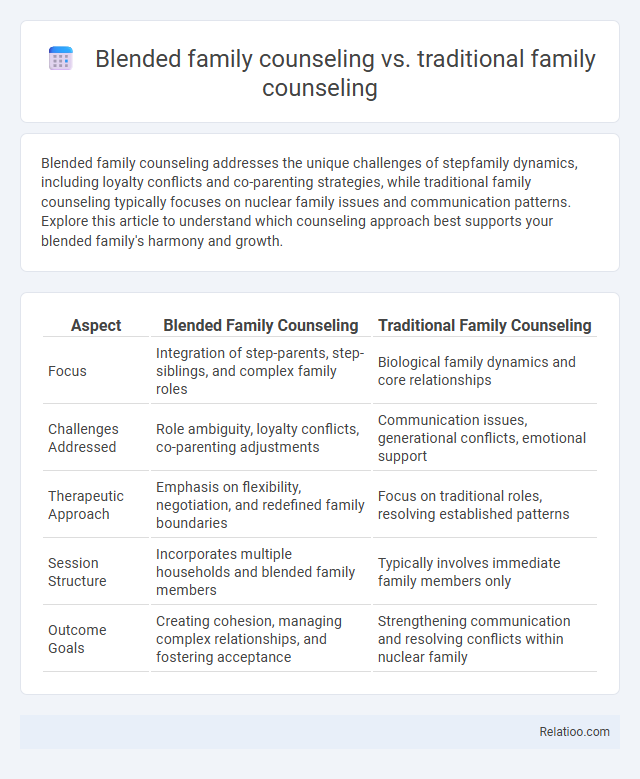Blended family counseling addresses the unique challenges of stepfamily dynamics, including loyalty conflicts and co-parenting strategies, while traditional family counseling typically focuses on nuclear family issues and communication patterns. Explore this article to understand which counseling approach best supports your blended family's harmony and growth.
Table of Comparison
| Aspect | Blended Family Counseling | Traditional Family Counseling |
|---|---|---|
| Focus | Integration of step-parents, step-siblings, and complex family roles | Biological family dynamics and core relationships |
| Challenges Addressed | Role ambiguity, loyalty conflicts, co-parenting adjustments | Communication issues, generational conflicts, emotional support |
| Therapeutic Approach | Emphasis on flexibility, negotiation, and redefined family boundaries | Focus on traditional roles, resolving established patterns |
| Session Structure | Incorporates multiple households and blended family members | Typically involves immediate family members only |
| Outcome Goals | Creating cohesion, managing complex relationships, and fostering acceptance | Strengthening communication and resolving conflicts within nuclear family |
Understanding Blended Family Counseling
Blended family counseling focuses on the unique dynamics and challenges faced by families formed through remarriage or partnerships, addressing issues like loyalty conflicts, role ambiguity, and communication gaps among step-siblings and step-parents. Traditional family counseling typically centers on biological family units and their interpersonal relationships, emphasizing conflict resolution and emotional support within a hereditary family context. You benefit from blended family counseling by gaining tailored strategies that foster healthy integration and cohesion in your newly structured family system.
Key Principles of Traditional Family Counseling
Traditional family counseling centers on structured communication patterns, clearly defined family roles, and hierarchical decision-making processes to restore balance and healthy dynamics. It emphasizes collective problem-solving, respect for established authority, and adherence to family norms to resolve conflicts and promote cohesion. Your experience in counseling may differ, as blended family counseling integrates these principles while addressing the complexities of stepfamily relationships and unique challenges in newly formed family units.
Unique Challenges in Blended Families
Blended family counseling addresses unique challenges such as step-parent and step-sibling relationship dynamics, loyalty conflicts, and complex co-parenting arrangements that traditional family counseling may not fully cover. Your experience in blended families involves navigating evolving family structures and blending distinct family cultures, which requires specialized therapeutic techniques. Traditional family counseling typically focuses on biological family issues, while blended family counseling emphasizes building cohesion and managing expectations among all members.
Communication Strategies in Both Approaches
Blended family counseling emphasizes tailored communication strategies that address the unique dynamics and conflicts arising from stepfamily roles, while traditional family counseling focuses on improving communication patterns within biological family units. Both approaches utilize active listening, empathy, and conflict resolution techniques, but blended family counseling prioritizes navigating loyalty conflicts and establishing new family rituals to strengthen bonds. Your therapy experience will benefit from recognizing these distinctions to effectively enhance communication and foster healthy relationships.
Conflict Resolution: Blended vs. Traditional Methods
Blended family counseling addresses unique conflicts arising from stepfamily dynamics, such as role ambiguity and loyalty struggles, using tailored communication and negotiation strategies. Traditional family counseling focuses on longstanding patterns within nuclear families, emphasizing repairing established relational dysfunctions through structured conflict resolution techniques. Your choice between blended and traditional methods depends on the family structure and requires approaches designed to effectively resolve distinct conflicts within each context.
Role of Stepparents in Counseling Sessions
Blended family counseling specifically addresses the complexities of stepparent roles, fostering communication and boundary-setting to integrate family members effectively. Traditional family counseling often centers on biological relationships and may overlook unique challenges stepparents face in establishing authority and emotional bonds. Counseling sessions involving stepparents prioritize navigating loyalty conflicts, co-parenting strategies, and creating a unified family identity to support healthy relational dynamics.
Establishing Boundaries and Roles
Blended family counseling focuses on establishing clear boundaries and roles to integrate stepfamily members, addressing unique challenges such as loyalty conflicts and role ambiguity. Traditional family counseling typically reinforces existing family roles and works on improving communication and conflict resolution within biologically related members. Your therapy choice should consider whether the emphasis is on blending different family units or resolving issues within an established family system.
Addressing Loyalty Conflicts and Alliances
Blended family counseling specifically targets loyalty conflicts and alliances that arise from stepfamily dynamics, such as divided loyalties between biological and stepparents, which are less prominent in traditional family counseling. Traditional family counseling often addresses loyalty conflicts within nuclear families, focusing on communication and boundary issues among biological family members. General counseling may touch on loyalty and alliance issues but lacks the specialized framework to navigate the complex, multi-layered relationships characteristic of blended families.
Goals and Outcomes: What to Expect
Blended family counseling targets the unique dynamics of stepfamilies, aiming to improve communication and foster unity among biological and stepparents, while traditional family counseling focuses on resolving conflicts and strengthening bonds within nuclear families. Counseling, in general, seeks to enhance emotional well-being and equip Your family with coping strategies tailored to specific challenges. Expect goal-oriented outcomes such as improved relationships, effective conflict resolution, and emotional resilience in all approaches.
Choosing the Right Counseling Approach for Your Family
Choosing the right counseling approach for your family involves understanding the distinct benefits of blended family counseling, traditional family counseling, and general counseling services. Blended family counseling addresses the unique dynamics and challenges of stepfamilies and co-parenting relationships, while traditional family counseling focuses on improving communication and resolving conflicts within nuclear or extended families. Evaluating your family's specific needs, such as complexity of relationships and areas of conflict, will help determine whether a specialized blended approach or a broader traditional counseling method is best suited to foster healing and growth.

Infographic: Blended family counseling vs traditional family counseling
 relatioo.com
relatioo.com